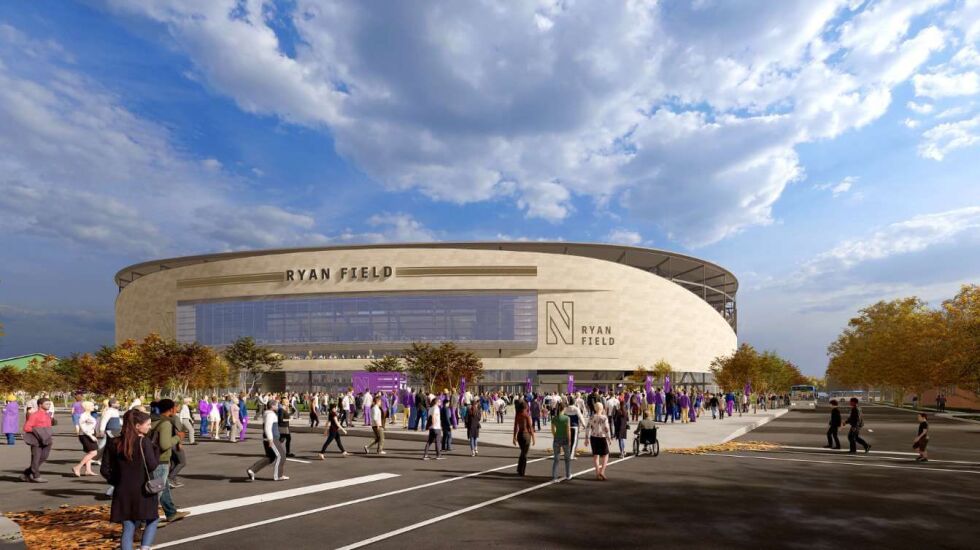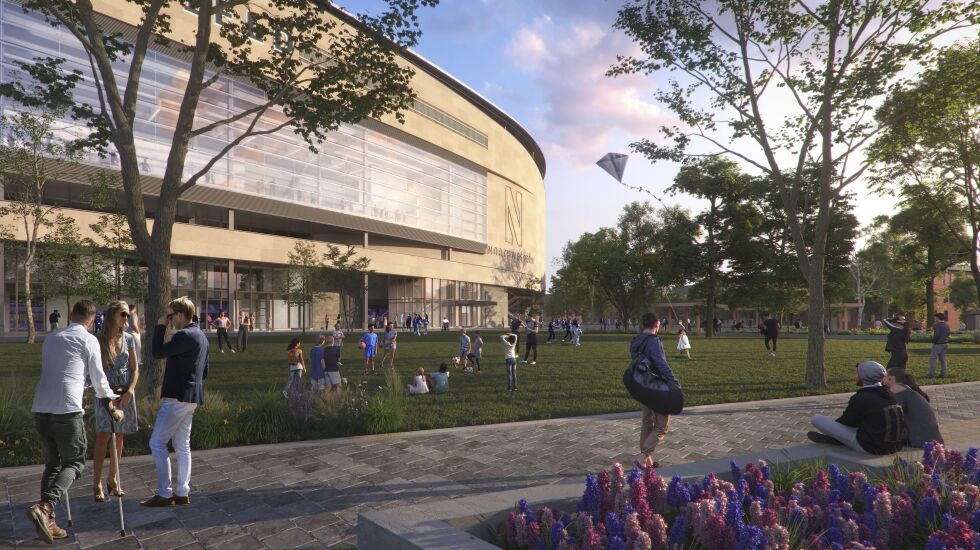
Pity poor Northwestern University.
No, we’re not talking “poor” in the sense of lacking funds. The place last reported a $14.9 billion endowment. It’s “poor” in the sense of being unlucky, maybe a bit clumsy, and there are no references intended here to the football team and its recently completed 1-11 season. Northwestern is known for making its student-athletes study, so those lads are under pressure that’s worse than a bowl game.
It’s just that Northwestern is doing something distinctly Chicago Bears-like, aside from losing. Without a lot of goodwill at its back, the school has been showing plans for improving Ryan Field, a stadium that, unlike most of those at the collegiate level, sits squarely in an area of large single-family homes.
The houses contain a lot of professional people who pay a king’s ransom in property taxes and care about what’s happening in the neighborhood. They’re starting to organize themselves in opposition to the proposal, calling it a “field of schemes.”
David DeCarlo, an attorney, is co-founder of the incipient Most Livable City Association. He said Northwestern has boasted about “community engagement” involving the plans, but they’ve really been one-sided meetings trying to make them seem a done deal.
“We’re not opposed to redeveloping Ryan Field. What we’re opposed to is just completely upending the zoning code that has protected our community for years,” he said.
DeCarlo said the university is proposing “a tax-exempt booze-and-entertainment center” that will upset the quality of life in north Evanston and south Wilmette. This part of the North Shore welcomes the football scene because the interruptions are infrequent and mostly fun. Local lore has it that the main exception is when Buckeye Nation descends and threatens the social order.
Paradoxically for this age, the university has proposed rebuilding the football seating at smaller capacity, taking it down to 35,000 from the current 47,000. Other Big Ten venues pack in huge crowds, but Northwestern said it’s going for a more intimate fan experience —premium seating for everybody.

It would lower the stadium’s overall profile but add equipment that would make it suitable for perhaps 12 full-capacity concerts per year. That’s the part, along with a proposed loosening of the rules on alcohol sales, that gets people upset. Currently, alcohol consumption is limited to particular parts of the stadium.
“We don’t want to become Wrigleyville — I’ve lived there, done that,” said Fiona McCarthy, another nearby resident, in a statement provided by Most Livable City.
“Ryan Field differs from most other college stadiums in that it sits in the heart of a residential neighborhood. We knew when we moved here there would be a handful of home games. We did not know Northwestern, a nonprofit university, would try to rezone the stadium to profit from massive, alcohol-fueled concerts and nighttime entertainment.”
DeCarlo said his group was drawing support from many residents, plus nearby businesses on Central Street worried that more stadium crowds would keep everyday patrons away.
Northwestern said in a statement that community input has influenced the design and that the school would continue to hold meetings and “listening sessions” with the neighbors. It has published a lot of information on a website, highlighting data from a consultants’ report it commissioned. The plan, with a reported budget of about $800 million, promises $11 million in direct fees to Evanston and an economic impact of $660 million during the construction phase. The numbers try to parry the argument that Northwestern, which doesn’t owe property taxes, gets a sweet deal in Evanston.
The school said the project requires no public subsidies. It has said the lower-profile design would minimize noise and light pollution. The school has proposed working through the local approvals over the next few months, starting construction after the 2023 season wraps up and dedicating the new surroundings in the fall of 2026.

Evanston Mayor Daniel Biss didn’t return a call Friday. This issue is certain to be a hot one, pitting sophisticated citizenry against the town’s premier institution, and one that most Evanstonians appreciate. Judging from the criticism, Northwestern’s opening drive on this gridiron was a poorly executed end around.
Some might come to the same conclusion as an alumnus who, writing in The Daily Northwestern, suggested the school forget about Ryan Field and move the Wildcats to Soldier Field, particularly if the Bears don’t have use for it anymore. It makes some sense but won’t produce the event revenue Northwestern is targeting. And it just seems too much of a change for that campus. NU hasn’t said where the Wildcats will play during stadium construction.
The Bears, however, should be watching closely. The fight over Ryan Field, on a smaller scale, will provide object lessons for what it might take to extract a stadium from Arlington Heights. It’s a game of persuasion and power politics.
Bear down, Bears, and pay attention like it’s a class at NU.







